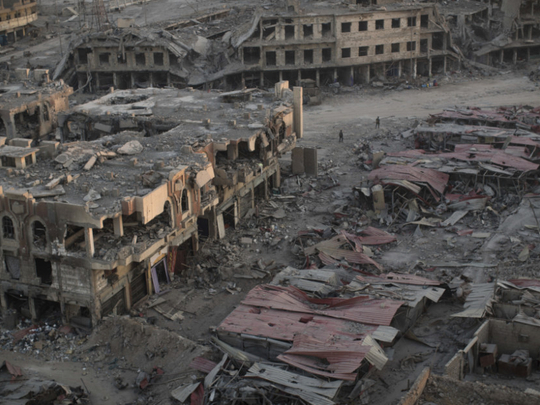
The media around the world celebrated the victory of Iraqi forces in driving away Daesh [the self-declared Islamic State of Iraq and the Levant] from Mosul, as it virtually spells the death knell for the terrorist group and its savage attempts to build a caliphate in Iraq and Syria.
The New York Times reminded that there is still plenty of urgent work to be done — by Iraqis, the United States, regional neighbours and others — to stabilise Iraq and Syria. “The longer-term challenge will be addressing the complex factors that have created conditions for the [Daesh] group to thrive, including destructive rivalries between [Sunnis and Shiites], corruption and the failure of governments to meet their citizens’ economic and security needs,” the newspaper said in an editorial. “Iraq squandered one opportunity to remake itself into a stable and pluralistic country. With Isis [Daesh] on the run, it should seize this second chance.”
The Chicago Tribune said Iraqi Prime Minister Haider Al Abadi’s government deserves praise for this pivotal moment and it presents Baghdad with the challenge of ensuring that the Daesh doesn’t mount a comeback.
“We hope Baghdad’s Shiite-led government learnt something from Mosul’s fall in 2014. The city, as well as other parts of northern Iraq, is home to large numbers of [Sunnis], a minority in Iraq that historically has been marginalised by the country’s Shiite leadership... Leaders in Baghdad have talked of moving toward decentralisation that shares the country’s oil wealth equitably among the provinces. Iraqis would also get more authority to set up their own security at the provincial level. That means, for example, Sunni-dominant areas would get a fair share of the country’s resources, and would not have to rely on Shiite forces for security,” the paper said in an editorial, adding that Al Abadi should make good on his promises.
The Sydney Morning Herald said the defeat of Daesh in Mosul is a cause for celebration, but the celebrations should be tempered considering that thousands of lives were lost and more than a million were displaced.
“It [the Iraqi win in Mosul] will likely end the barbarous regime’s territorial ambition for a caliphate encompassing Iraq and Syria, declared in Mosul from a pulpit at the Grand Al Nouri Mosque by Abu Bakr Al Baghdadi in 2014. The group’s power and resources are vastly diminished since its peak of ruling over as many as nine million people at the end of that year,” the paper said in an editorial.
“Immense challenges lie ahead in the provision of food, shelter and health services for the people, traumatised mentally as well as physically. The situation will remain complex and dangerous even in ‘peace’ as the uneasy alliances formed against the common enemy disintegrate,” it added.
Indian newspaper The Hindu harped on the need to win over the people following the victory in Mosul.
In an editorial, it said: “The destruction of the ‘Caliphate’, the proto-state that Al Baghdadi established, doesn’t mean that the IS [Daesh] as an insurgency has been defeated... The IS [Daesh] may also bide its time. Al Abadi should reassure Mosul’s population that his government will not make the mistakes his predecessor committed. He has retaken the city, and now he has to win over its people.”
The News in Pakistan, echoing the sentiments, called it a most significant victory but was troubled by the deaths of thousands of civilians in the fighting. “War is never pretty, but this was a war that was aimed at winning back the people of Iraq,” the paper said in an editorial. “Mosul may be back under Iraqi control but until peace returns, this is a battle that has not yet been won. To do that the Iraqi government will have to win back the people.”




_resources1_16a31069e4e_small.jpg)







